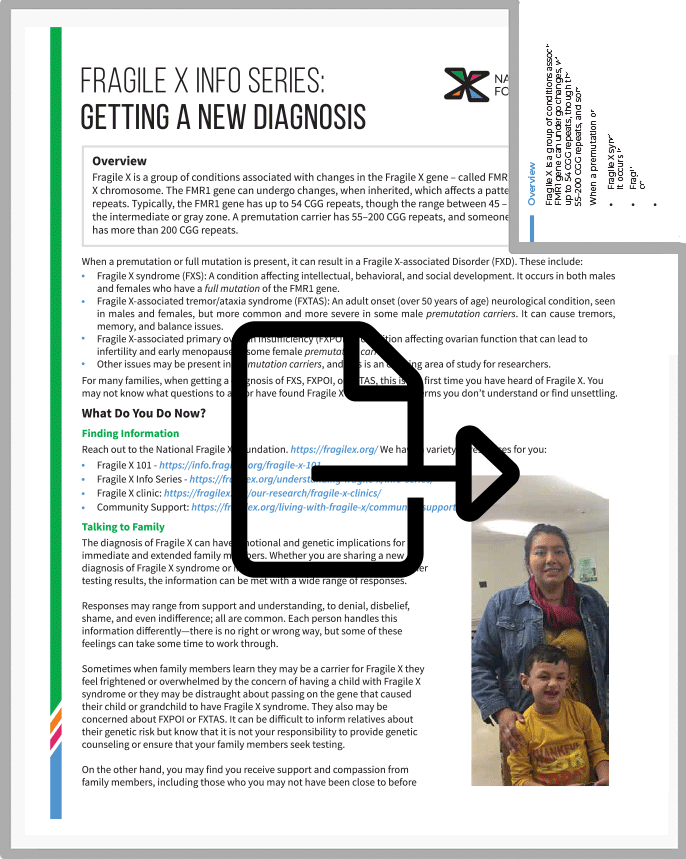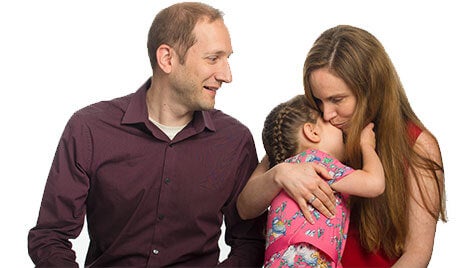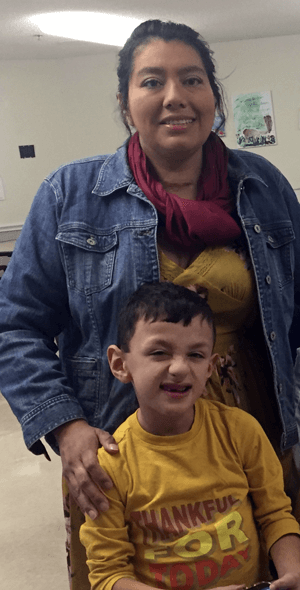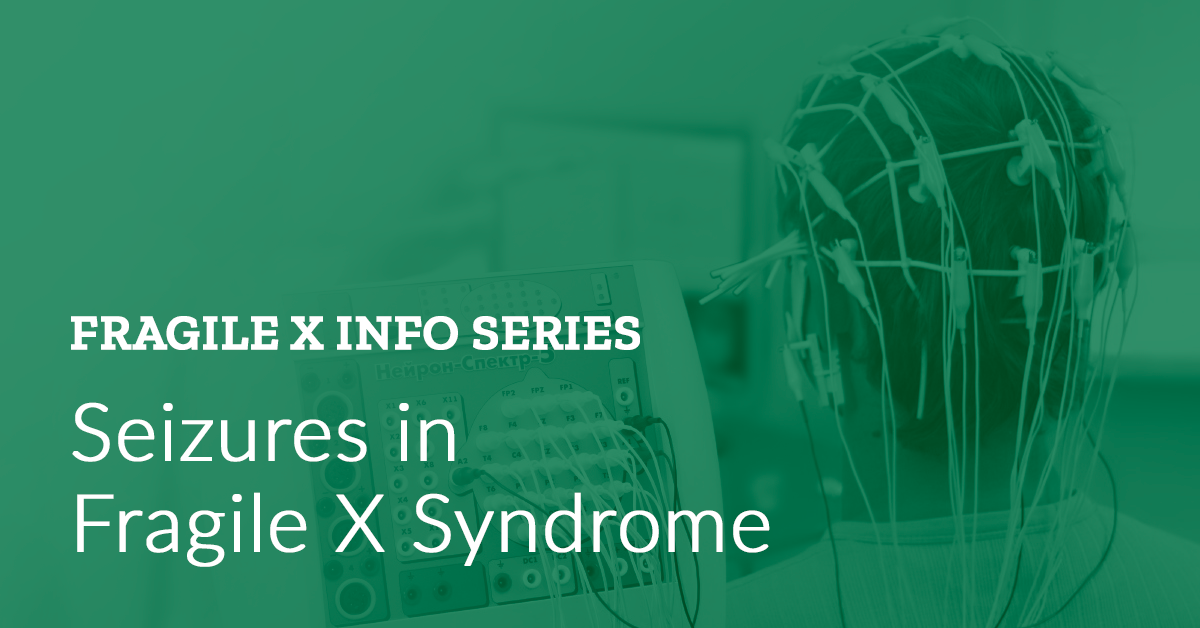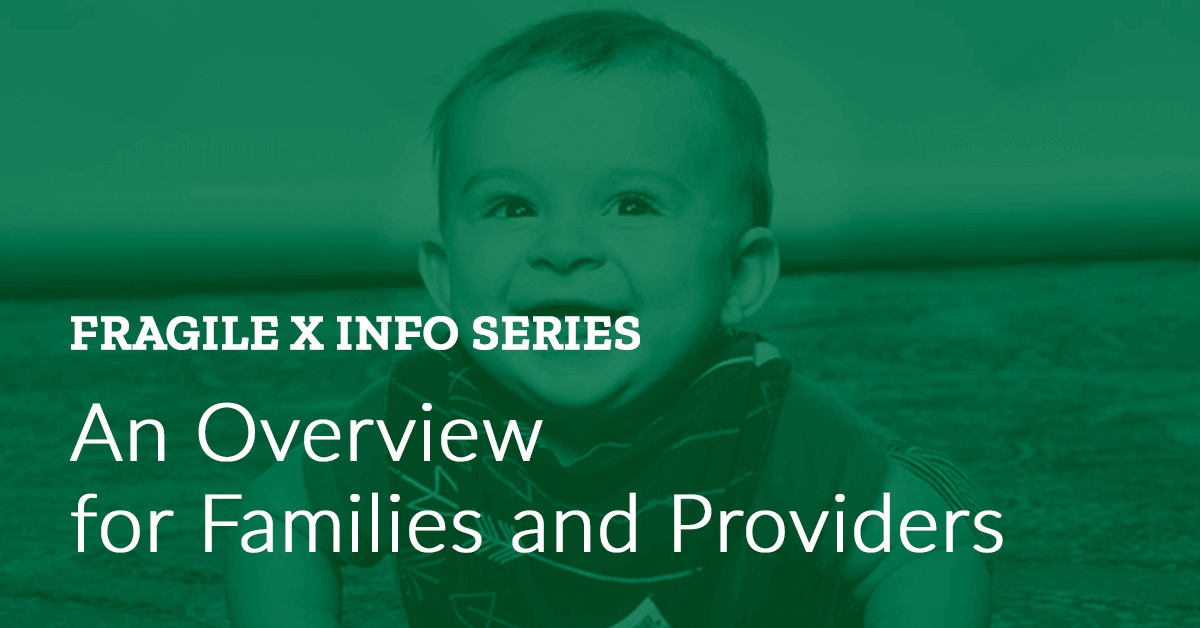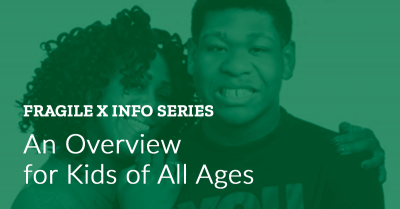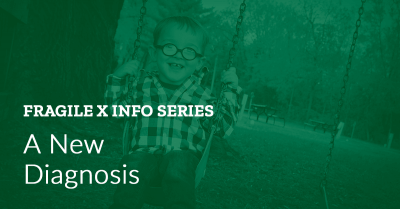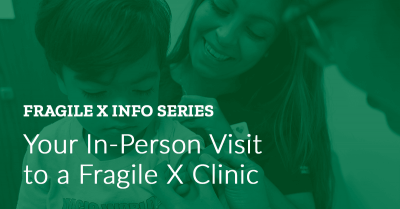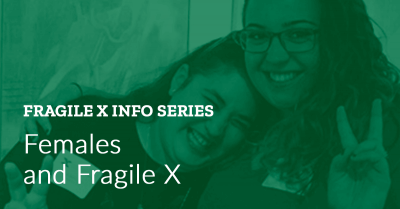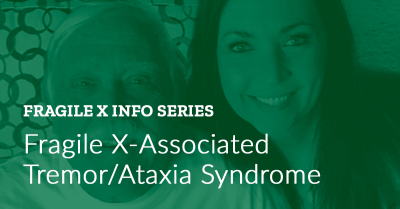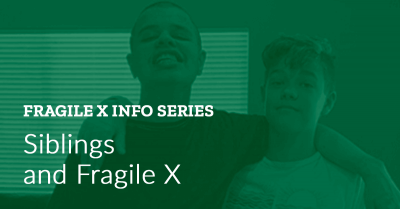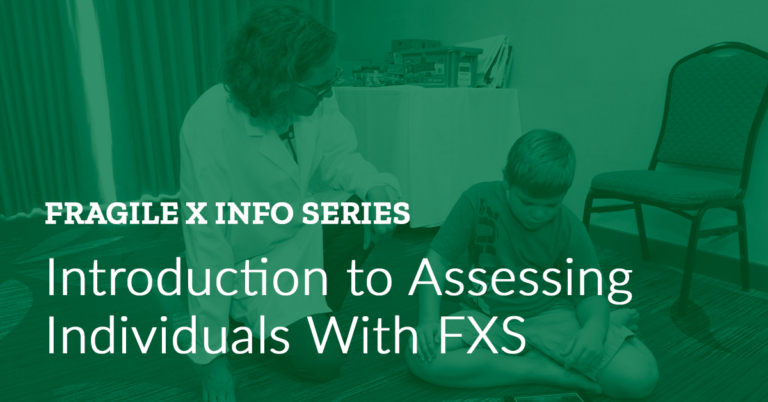Fragile X Info Series
For many families, when getting a diagnosis of FXS, FXPOI, or FXTAS, this is the first time you have heard of Fragile X. You may not know what questions to ask or have found Fragile X literature full of terms you don’t understand or find unsettling.
overview of fragile x syndrome and associated disorders
Fragile X is a group of conditions associated with changes in the Fragile X gene. The gene (also known by its scientific name of “FMR1”) can undergo changes when inherited, which affects a pattern of DNA called CGG repeats. Typically, the FMR1 gene has up to 54 CGG repeats, with the upper range of 45–54 repeats called the “intermediate” or “gray” zone. Someone with 55–200 CGG repeats is a premutation carrier, and someone with more than 200 CGG repeats has a full mutation.
When a premutation or full mutation is present, it can result in a Fragile X-associated disorder (FXD). These include:
FXS
FRAGILE X SYNDROME
FXS is a condition affecting intellectual, behavioral, and social development. It occurs in both males and females who have a full mutation of the FMR1 gene.
FXTAS
FRAGILE X-ASSOCIATED TREMOR/ATAXIA SYNDROME
FXTAS is an adult onset (over 50 years of age) neurological condition, seen in males and females, but more common and more severe in some male premutation carriers. It can cause tremors, memory, and balance issues.
FXPOI
FRAGILE X-ASSOCIATED PRIMARY OVARIAN INSUFFICIENCY
FXPOI is a condition affecting ovarian function that can lead to infertility and early menopause in some female premutation carriers.
OTHER PREMUTATION CONDITIONS
Other issues may be present in premutation carriers, and is an ongoing area of study for researchers.
FINDING INFORMATION
We have a variety of resources for you:
Fragile X 101: Learn the basics, and keep at hand as an ongoing reference.
Fragile X Info Series: The document you’re reading right now is part of this series, and we have many more on topics like FXS, FXTAS, FXPOI, testing, females, and being a sibling to someone with Fragile X.
Fragile X Clinics: Clinics specializing in Fragile X.
Community Support: NFXF chapters, community partners, and parent contacts, for the emotional and educational support you need.

What Do You Do Now?
Talking to Family
The diagnosis of Fragile X can have emotional and genetic implications for immediate and extended family members. Whether you are sharing a new diagnosis of Fragile X syndrome or informing family members of positive carrier testing results, the information can be met with a wide range of responses.
Responses may range from support and understanding, to denial, disbelief, shame, and even indifference; all are common. Each person handles this information differently — there is no right or wrong way, but some of these feelings can take some time to work through.
Sometimes when family members learn they may be a carrier for Fragile X they feel frightened or overwhelmed by the concern of having a child with Fragile X syndrome, or they may be distraught about passing on the gene that caused their child or grandchild to have Fragile X syndrome. They also may be concerned about FXPOI or FXTAS.
It can be difficult to inform relatives about their genetic risk but know that it is not your responsibility to provide genetic counseling or ensure that your family members seek testing.
On the other hand, you may find you receive support and compassion from family members, including those who you may not have been close to before this diagnosis. Sometimes these events can bring people together in their quest for treatment, information, and hope.
There may be many people whom you will want to tell about Fragile X — your doctor, your friends, young students at your child’s school, and you will want to be able to describe it in a way they will each understand.
to Friends
These conversations will most likely be very similar to what you tell your family, only without the complex emotions attached.
to Doctors
Whether it’s your child’s doctor or your own, you might start with how FXS affects your child and then direct the doctor to our website for more information. Depending on the current issues your child is facing, you may want to also bring information on Fragile X syndrome and give it to the doctor.
to Others at School
If you are going to talk to young children about Fragile X, keep it short and simple. If you’re not sure at what level to talk, ask one of your friends or neighbors who have a child in the same class. If you know a “typical” child your child’s age, ask them what they would like to know about FXS. If this is the first introduction for your child to new classmates, bring a favorite toy of your child’s so the other children see that your child is interested in the same things as they are.
You might consider sending a letter to the parents of the children in your child’s class. Not only will it educate them, but you can give them ideas on how and what to talk about with their own children. As the children get older, gear your talk to what you think they’re ready for; you will get a good idea of this by the questions they ask.
to Strangers
You’ll want to keep this simple unless they ask you questions. Know that if you do not feel like talking, you can give them something written. We’ve created a card to hand out in such situations. (Also see our Newly Diagnosed page.) It’s very simple, business-card size, and it directs them to our website for more information. You might also want to use this card in other situations too because of the website reference (teachers, medical professionals, therapists, etc.).
Genetic Counseling
Complex situations can arise when family members do not communicate with other relatives. Genetic counselors can assist you in identifying at-risk relatives in your family tree and can work with you to develop a strategy for approaching the subject of diagnostic or carrier testing.
Your reasons for telling others will be as varied as the situations in which you find yourself:
- You want your friends to be supportive.
- You want your doctor (other professionals) to be knowledgeable.
- You want other children to accept your child.
- Other people may be staring at your child.
- You just may want to raise awareness.
How We Can Help
The NFXF is dedicated to serving the entire Fragile X community to live their best lives by providing the knowledge, resources, and tools, until, and even after more effective treatments and a cure are achieved. Learn more with Fragile X 101.
If you have questions please reach out to us at treatment@fragilex.org or call (800) 688-8765.


